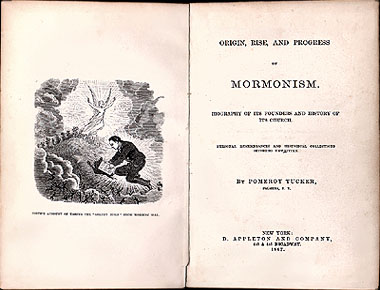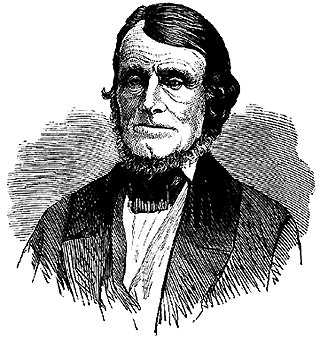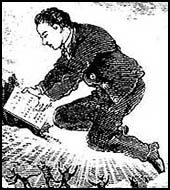
SPALDING STUDIES LIBRARY -- SPECIAL COLLECTIONS
Sp. Col. Index | Mormon Classics | Bookshelf | Newspaper Articles | History Vault
Pomeroy Tucker (1802 - 1870)
Origin, Rise, and Progress of Mormonism
(NYC: D. Appleton & Co., 1867)
Part 1: pp. 1-67 | Part 2: pp. 68-182 | Part 3: pp. 183-302
|
|

view frontispiece in in high resolution |
Tucker's May 1858 2-part article: "Mormonism and Joe Smith"
|
ORIGIN, RISE, AND PROGRESS: OF MORMONISM: BIOGRAPHY OF ITS FOUNDERS AND HISTORY OF ITS CHURCH. PERSONAL REMEMBRANCES AND HISTORICAL COLLECTIONS HITHERTO UNWRITTEN. BY POMEROY TUCKER, PALMYRA, N. Y. NEW YORK: D. APPLETON AND COMPANY. 443 & 445 BROADWAY. 1867 |
|
[ 7 ]
11 Biography of Joseph Smith, Jr. -- Early Life and Times of the 8 C O N T E N T S. CHAPTER VI. 58 Publication of the Mormon Bible -- Blooming of the Church of CHAPTER VII. 68 Modified Revelation -- Testimony of Witnesses -- A Prophet thatwas not a Prophet -- Sidney Rigdon the first regular Preacher of the New Gospel -- His Sermon -- Calvin Stoddard receives a "Call" -- Mormon Emigration to Ohio. CHAPTER VIII. 84 Style of the New Revelation -- Passages from the Book -- ScatteredTribes -- Journey from Jerusalem to the Promised Land -- Their Tribulations in the Wilderness and at Sea -- Records "hid up in the Hill Camorah" or Mormon Hill. CHAPTER IX. 111 Origin of the Book of Mormon -- Who Wrote it? -- MormonLegends -- Solomon Spaulding's Fable -- Rigdon and Smith the Schemers. CHAPTER X. 129 Kirtland, Ohio -- Maturity of the Mormon Church -- Theology ofthe Saints -- Brigham Young converted -- Martin Harris in Council -- A Division of the Mormons remove to Misouri -- Saints under Proscription. CHAPTER XI. 153 Mormons in Missouri -- Their Prosperity and Adversity -- Failureof Smith's Bank at Kirtland -- The Prophet and Young flee to Misouri -- Mob Conflicts -- Interposition of Government Authorities -- The Saints driven out of the State -- Scattered Tribes -- Asylum at Nauvoo. C O N T E N T S. 9 CHAPTER XII. 167 Mormons settle at Nauvoo -- Public Sympathy -- Accessions and CHAPTER XIII. 183 The Polygamous Revelation -- Vices of the Saints - Criminationsand Recriminations -- Conflict with State Authorities -- Assassination of Joseph and Hyrum Smith-- Young succeeds to the Spiritual Dictatorship -- Rigdon defreated and expelled. CHAPTER XIV. 203 Exodus from Illinois -- Bold Adventure of Brigham Young --Sufferings on the Plains -- Mexican War and Mormon Battalion -- Arrival st Salt Lake -- State of Deseret and Territory of Utah -- Young declared "Prophet of the Lord" -- Corner-Stone of the New Temple. CHAPTER XV. 224 Political and Military -- Recusancy of Young -- He circumventsthe Enemy -- Clandestine Mormonism -- Missionary Success -- Statistics of the Saints -- Utah, its Lakes and its City. 10 C O N T E N T S. CHAPTER XVI. 260 Modified Theology -- Young's Wealth -- Polygamy and Spiritual APPENDIX. 280 Letter of Ex-Governor Harding -- Fate of Parley P. Pratt -- TempleProject at Salt Lake -- Places of Mormon Worship -- Population of the City and Territory -- The Church and Polygamy -- Young's Tithing Resources -- Pioneer Mormons at Palmyra -- Sacred Archives -- "Command" to preach the Gospel of Nephi -- Statement of the late Rev. James Townsend - War Romance of Mormonism -- Institution of the Mormon Metropolis. ERRATA. Page 123, 4th line, "N. Y." is misprinted for Pa.Page 203, 2d line, read "unpopulated and unexplored region." Page 238, 5th line from bottom, right name "Stephen S. Harding." Page 284, 13th line from top, supply omission, "sixty wives, (including his spiritual household.) &c.BR> In Preface, p. 6, the author's name is omitted from the address of Mr. Weed's letter to him as written. |
|
58
M O R M O N I S M:
CHAPTER VI.
ITS ORIGIN, RISE, AND PROGRESS. 59 upon them by the prophet, accompanied by the "laying on of hands" and other ceremonious observances, adding great "promises" of future spiritual endowment, to depend in an essential manner on their fidelity and efficiency in the trust already reposed in them. The participants generally in this incipient church inauguration were the individuals named as the pioneer saints in a preceding chapter, with perhaps few changes pro and con. The rite of baptism by immersion was administered by the prophet to Cowdery and Harris at their particular request -- a pool for that purpose having been created by constructing a dam across a brook near the place of meeting; and then the other baptisms on this occasion were conducted by Cowdery, including in these benefits both the aged parents of the revelator, Page, Mrs. Rockwell, Dolly Proper, and several of the Whitmer brothers. So far as can be recollected of the proceedings, as verbally reported at the time, no others were then baptized; but afterward this baptismal service was extended to all the saints who had not already been the favored subjects of that ritual, Cowdery continuing to officiate in these solemnities. The prophet himself was not baptized in this instance, the explanation of the omission being, as stated by some of the faithful, that he was elevated far above "worldly baptism" by reason of his "spiritual sphere;" but another account -- doubtless the accepted 60 M O R M O N I S M: one -- assigned as the reason in the case that he had previously received the ordinance in Pennsylvania by the ministration of "Brother Rigdon," and was the first Mormon baptized since the times of the primitive Nephites. A few days after this preliminary launching of the Mormon ship Zion -- this primeval foundation of the Mormon theocracy -- some ten or twelve of the saints went to Fayette, in an adjoining county, where similar observances were had in the formation of the church. There were about thirty persons in attendance on this occasion, believers and spectators, and a number of new converts were reported, Cowdery again performing the baptismal service. But, finally, it was found that the prophet's own county was an unfavorable locality for success in this wonderful religious speculation; the new gospel was held in light repute by the "Gentile" people; conversions did not come up to the anticipations of the leaders; and in the course of the same year these pioneer Mormons emigrated to Ohio. Now, let the reader's attention be carried back to the commencement of the Golden Bible publication. The book, as a money-making enterprise, fell dead before the public. As a religious demonstration, it was received by the community as "stale, flat, and fulsome." It was repulsive to the popular common-sense, and, beyond the minds of its preexistent devotees, simply awakened contempt and ridicule. It ITS ORIGIN, RISE, AND PROGRESS. 61 found no buyers, or but very few. So that the glittering visions of Harris and others, who might have thought as he had done, seemed to turn out as illusory as had been those of Smith's money-digging dupes. Hence another "command" became necessary in regard to the sale of the book, after a few weeks' faithful but unsuccessful trial of the market by Harris as a monopolist salesman. * This was easily called down by Smith in favor of his patriarch father. Time passed, and yet the disappointment was unalleviated. The patriarch having been permitted by this changed revelation, with the consent of Harris, to appropriate a portion of the avails of sales toward his family necessities, he effected some sales, chiefly in barter trades, on accommodating terms for the purchasers of the books, always nominally maintaining the revealed price of ten shillings, to avoid the awful penalty of "instant death" for any departure from it. Pedestrian ________ * Harris was proverbially a peaceful as well as an honest man. He was slow to retaliate an offence. The following anecdote will show what manner of man he was. Urging the sale of the book with pertinacious confidence in the genuiness of the Smith revelation, he fell into debate about its character with a neighbor of an irascible temperament. His opponent became angry, and struck him a severe blow upon the right side of his face. instantly turning toward the assailant the other cheek, he quoted the Christian maxim, reading it from the book in his hand, page 481 (as it also appears in Matthew): "Whosoever shall smite thee on the right cheek, turn to him the other also." 62 M O R M O N I S M: peddling jaunts were made in the neighboring villages and surrounding country, and books peddled off by him in exchange for various articles of farmers' produce and shop merchandise, such as "wouldn't come amiss for family use in hard times," In this way considerable improvement was made in the old "saint's" exchequer. Harris, meanwhile, seemed to stand firm in his adhesion to the book's divinity, and always had at his tongue's end an amplitude of scriptural and Mormonic quotations of "promises," giving satisfactory assurance of his ultimate pecuniary and spiritual salvation. Many appropriate incidents might be related from the memory of individuals yet living at the original scene of this blooming of the Mormon Church, illustrative of the shallowness of the great imposture; but which, given in detail, would surfeit the reader's curiosity. A single anecdote will suffice to show the degree of sincerity attached to the pretended "commandment price" of the book. The Patriarch and President of the Mormon Church was now preparing to remove with his family to Ohio, where the Prophet Joseph and his brother Hyrum, with others of the faith, had already preceded them, and it was necessary to procure some articles of outfit. In pursuance of this object, he took a basket of "bibles" in his hand and walked to Palmyra village, where he had usually done his small ITS ORIGIN, RISE, AND PROGRESS. 63 traffic, and where sundry unadjusted little scores were ready to confront him, which his overplus book avails and other resources had been insufficient to liquidate, By the then prevailing legal system for the collection of debts (residing as he did, over the county line from Palmyra), he made himself liable to suit by warrant and also detention in imprisonment for non-payment. But necessity being his master, he had taken the incautious venture, and soon found himself in the constable's custody at the suit of a creditor for a small book account. The parties appeared before A.R. Tiffany, Esq., a justice of the peace for Wayne County, by whom the warrant had been issued, After some preliminary parleying by the debtor, he invited and enjoyed a private interview with the creditor in an adjoining room. The debt and costs had now reached the aggregate of $5.63. The embarrassments in the case, after some brief discussion, were found to be of a difficult nature. At last, laying the good-natured claimant under strict confidential injunction, and referring with solemn air to the "command" by which be was empowered to sell his Mormon work only at the price of $1.25 per copy, the crafty "patriarch" proposed, nevertheless, on the express condition that his perfidy should not be exposed, the offer of seven books in full for the demand, being a fraction more than eighty cents apiece. The joke was relished as too 64 M O R M O N I S M: good to go unpatronized, and though the books were not regarded as possessing any value the claimant, more in a spirit of mischief than otherwise, accepted the compromise accordingly. The finale was, that the Mormon saint was permitted to slip home from a side door, to avoid the importunities from other creditors and it is believed this was his last appearance in Palmyra by daylight. Such was the advent, and such the popular reception of the Book of Mormon, and the Church of the Latter Day Saints founded thereon as its corner-stone, at the place of their professed origin. The book has since gone through many editions in the different languages of the civilized world. The title-page is as follows: "BOOK OF MORMON; AN ACCOUNT WRITTEN BY THE HAND OF MORMON UPON PLATES TAKEN FROM THE PLATES OF NEPHI. "Wherefore it is an abridgment of the Record of the People of Nephi; and also of the Lamanites; written to the Lamanites, which are a remnant of the House of Israel; and also to Jew and Gentile; written by way of commandment, and also by the spirit of Prophesy and Revelation. Written, and sealed up, and hid up unto the Lord, that they might not be destroyed; to come forth by the gift and power of God, unto the interpretation thereof; sealed by the hand of Moroni, and hid up unto the Lord, to come forth in due time by the way of Gentile; the interpretation thereof by the gift of God; an abridgement taken from the Book of Ether. "Also, which is a Record of the People of Jared, which were scattered at the time the Lord confounded the language of the people when ITS ORIGIN, RISE, AND PROGRESS. 65 they were building a tower to get to Heaven: which is to show unto the remnant of the House of Israel how great things the Lord hath done for their fathers; and that they may know the covenants of the Lord, that they are not cast off forever; and also to the convincing of the Jew and Gentile that Jesus is the Christ, the Eternal God, manifesting Himself unto all nations. And now if there be fault, it be the mistake of men; wherefore condemn not the things of God, that ye may be found spotless at the judgement seat of Christ. "Author and Proprietor. "Palmyra: "Printed by E. B. Grandin, for the Author. "1830." In revised editions as printed at Nauvoo and Salt Lake, the prima facie inconstancy of styling Smith as the "Author and Proprietor" of the book, as above seen to have been originally assumed, is removed by denominating him as "Translator" only. The first edition also contained a precautionary "preface" in reference to the lost translations before mentioned, which is omitted in the revised editions. It is in the following words: "To the Reader -- "As many false reports have been circulated respecting the following work, and also many unlawful measures taken by the evil-designing persons to destroy me, and also the work, I would inform you that I translated, by the gift and power of God, and caused to be written, one hundred and sixteen pages, the 66 M O R M O N I S M: which I took from the Book of Lehi, which was an account abridged from the plates of Lehi, by the hand of Mormon; which said account, some person or persons have stolen and kept from me, notwithstanding my utmost exertions to recover it again -- and being commanded of the Lord that I should not translate the same over again, for Satan had put it into their hearts to tempt the Lord their God, by altering the words, that they did read contrary from that which I translated and caused to be written; and if I should bring forth the same words again, or, in other words, if I should translate the same over again, they would publish that which they had stolen, and Satan would stir up their hearts of this generation, that they might not receive this work: but behold, the Lord said unto me, I will not suffer that Satan shall accomplish his evil design in this thing; therefore thou shalt translate from the plates of Nephi, until ye come to that which ye have translated, which ye have retained; and behold ye shall publish it as the record of Nephi; and thus I will confound those who have altered my words. I will not suffer that they shall destroy my work; yea, I will shew unto them that my wisdom is greater than the cunning of the devil. Wherefore, to be obedient unto the commandments of God, I have, through His grace and mercy, accomplished that which he hath commanded me respecting this thing. I would also inform you that ITS ORIGIN, RISE, AND PROGRESS. 67 the plates of which hath been spoken, were found in the township of Manchester, Ontario county, New York. "THE AUTHOR." This Mormon revelation is divided into various books, which are here given in the order as they appear in the printed work, viz: "The First Book of Nephi, his Reign and Ministry," seven chapters; "The Second Book of Nephi," fifteen chapters; "The Book of Jacob, the Brother of Nephi," five chapters; "The Book of Enos," one chapter; "The Book of Jarom," one chapter; "The Book of Omni," one chapter; "The Words of Mormon," one chapter; "The Book of Mosiah," thirteen chapters; "The Book of Alma, the Son of Alma," thirty chapters; "The Book of Helaman," five chapters; "The Book of Nephi, the Son of Nephi, which was the Son of Helaman," fourteen chapters; "The Book of Nephi, which is the Son of Nephi, one of the Disciples of Jesus Christ," one chapter; "Book of Mormon," four chapters; "Book of Ether," six chapters; "Book of Moroni," ten chapters. The volume contains five hundred and eighty-eight pages, common duodecimo, small pica letter. continue reading on: p. 68 |
|
Transcriber's Comments
|
Return to top of the page
Return to: Special Collections Index | New Spalding Studies Library
last revised: Aug. 23, 2006

